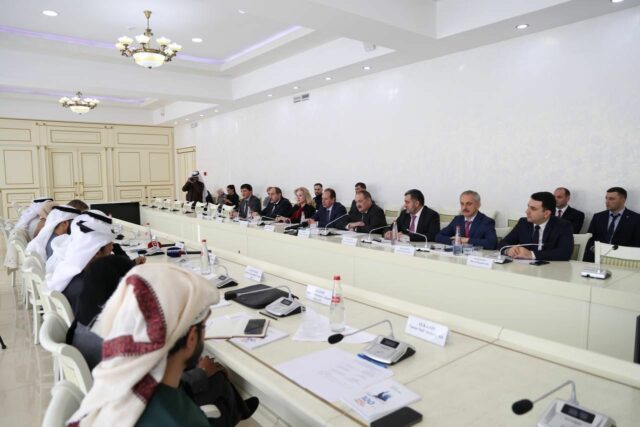
Kavkaz Files ISSN 2975-0474 Volume 21 Issue 3
Author: OSINT Team
Dagestan State Pedagogical University (DSPU) and Mohammed bin Zayed University of Humanities in the United Arab Emirates (UAE) recently entered into a cooperative agreement, primarily focusing on student and teacher exchanges and collaborations in education. This development underscores Abu Dhabi’s foreign policy interests in the North Caucasus, especially given the Emirati embassy’s cultural initiatives in Dagestan.
The strong Emirati presence in the region aligns with Russia’s broader strategy in the Arab-Muslim world, as evidenced by President Vladimir Putin’s recent visit to the Gulf.
The collaboration may also bolster Moscow’s efforts to assess the viability of Islamic financial products within its borders, considering Dagestan’s participation in a pilot project for Islamic banking.
Key Findings
- The agreement between DSPU and Mohammed bin Zayed University signifies an expanding collaboration, particularly in education, between Dagestan and the UAE.
- The UAE’s increasing engagement in the North Caucasus aligns with Russian geopolitical interests in the Arab-Muslim world.
- The cooperative venture may support Dagestan’s involvement in the pilot project for Islamic banking, started by the Russian State Duma.
Background Information
On January 15th, 2024, Dagestan State Pedagogical University and Mohammed bin Zayed University of Humanities have formalised their commitment to enhance collaboration. The agreement spans various areas, including student and teacher exchanges, joint educational initiatives for gifted children, and efforts to improve Arabic language teaching.
Discussions have occurred regarding cooperation in religious education, focusing on sharing experiences in issuing fatwas, and delivering Friday sermons.
Analysis
The cooperation between DSPU and the UAE reflects a broader trend of Emirati involvement in the North Caucasus, evident in cultural events organised by the Emirati embassy in Dagestan.
Considering Putin’s recent visits to the UAE and Saudi Arabia, Abu Dhabi’s major involvement in Dagestan, and in general in the North Caucasus, supports Moscow’s strategy in strengthening relations with the Arab-Muslim world.
The joint educational initiatives and the focus on Arabic language teaching indicate a multi-dimensional approach to collaboration, extending beyond traditional diplomatic ties.
Looking at the regional geopolitics, the Republic of Dagestan holds a pivotal role in the broader geopolitical landscape of the North Caucasus and the Caspian Sea region. The Kremlin designated Dagestan as a regional logistics hub with connections to the Middle East and Central Asia, strategically positioning it to facilitate trade and regional cooperation.
From the Russian perspective, fostering tourism and attracting foreign investments to Dagestan emerges as a crucial regional objective. This approach aims to address persistent socioeconomic challenges such as unemployment, organised crime, and the historical spectres of radicalisation and terrorism. Despite a consistent decline in terrorist and violent incidents since 2010, the threat of jihadist propaganda and the presence of terrorist organisations remain pressing concerns for the region.
Conversely, from the UAE’s standpoint, Dagestan’s historical significance as a former epicentre of Arabic language and production, combined with its predominant Islamic identity, presents an opportunity for cultural diplomacy.
By promoting Emirati culture and strengthening education cooperation, the UAE aims to forge a meaningful connection with the local Dagestani population and, therefore, with Russia.
Drawing parallels with successful initiatives in neighbouring Chechnya, the UAE is likely to employ cultural and religious diplomacy to access a strategic market. Moreover, the UAE’s support for Islamic banking and finance aligns with Moscow’s pilot project established in Dagestan, Chechnya, Tatarstan, and Bashkortostan to promote Islamic financial products, underscoring the potential synergy between Emirati interests and local priorities in the financial sector.
Read more | United Arab Emirates cultural diplomacy in Dagestan |
Risk Assessment
The primary risk lies in potential tensions arising from cultural and educational collaborations becoming entangled with political or religious issues. Given the sensitivity of religious education discussions, there may be challenges in harmonising the divergent approaches of Dagestan and the UAE. Geopolitical shifts in the Arab-Muslim world or the North Caucasus could affect the sustainability of this collaboration.
Scenarios Analysis
- Optimistic Scenario. The collaboration between DSPU and Mohammed bin Zayed University flourishes, leading to strengthened educational ties, enhanced cultural understanding, and a positive impact on Dagestan’s participation in the Islamic banking pilot project.
- Neutral Scenario. The partnership faces challenges related to cultural and religious differences, resulting in slower progress in educational initiatives. However, the cooperative efforts continue without major disruptions.
- Pessimistic Scenario. Political tensions or external geopolitical developments strain the partnership, leading to a breakdown in collaboration and potential negative repercussions for both Dagestan and the UAE.
Conclusion/Recommendations
In conclusion, the agreement between DSPU and Mohammed bin Zayed University represents a significant step in fostering collaboration between Dagestan and the UAE. To mitigate potential risks, it is advisable to establish clear frameworks for navigating cultural and religious differences.
Ongoing diplomatic efforts should prioritise maintaining the positive momentum in educational exchanges, while closely monitoring geopolitical developments to adapt to potential shifts in the region. This collaboration has the potential to contribute positively to both regional stability and Moscow’s broader strategic goals in the Arab-Muslim world.
For those with an interest in acquiring comprehensive insights into political and economic dynamics of Dagestan and Emirati regional involvment, we encourage you to reach out to our team by sending an email to info@specialeurasia.com. We are poised to facilitate an assessment of the opportunity for you to obtain a meticulously crafted and specialised report tailored to your intelligence needs.
Read more | North Caucasus’ Economic Performance in 2023: An Overview |
